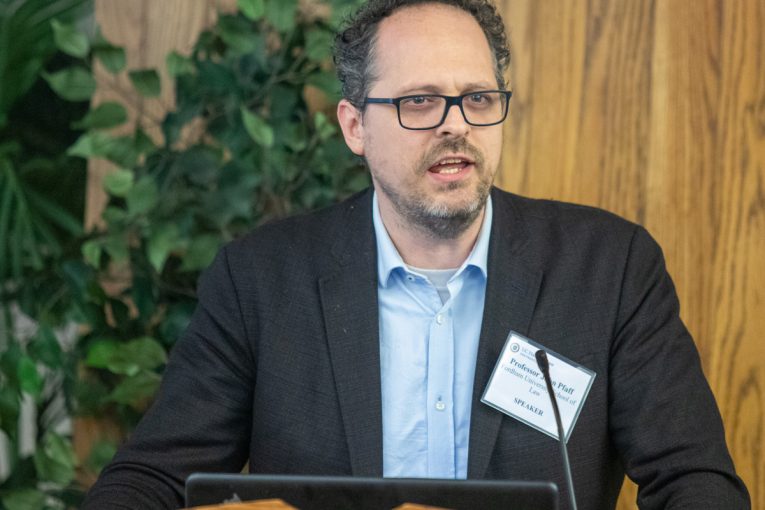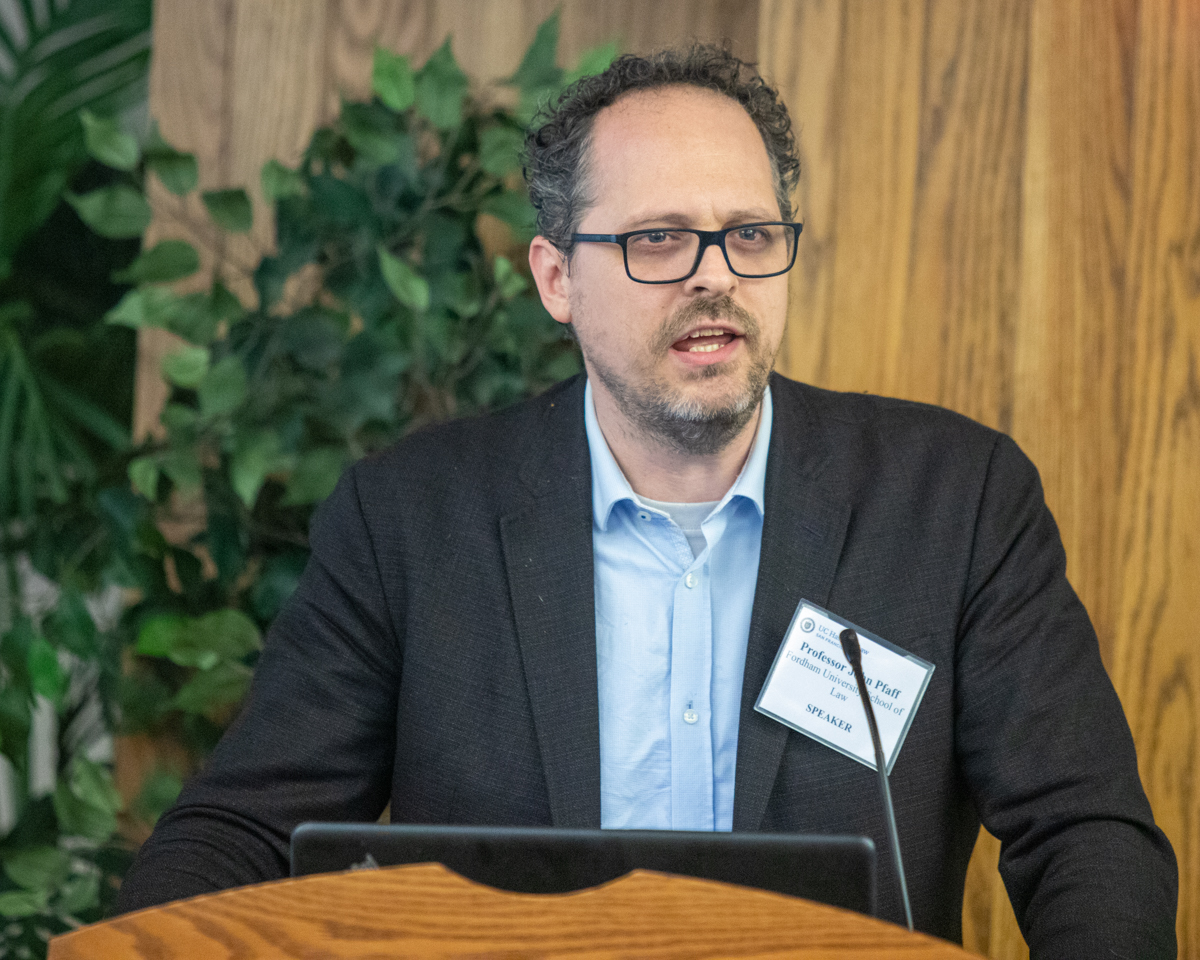

Fordham University Law Professor John Pfaff, author of the book Locked In, called the recent progressive prosecution movement “an interesting challenge” on Friday during the Symposium at UC Hastings.
On the one hand, he pointed out that the movement was only about ten years old and thus he could talk about it in about 45 minutes. On the other hand, though, he found it impossible to talk about because “as the days go by, I have absolutely no idea what the term progressive prosecutor means.
“In fact, I’ve reached the conclusion that less than ten years old, it might be time to retire the term altogether,” he said.
He went through a brief history of pre-2010 reformers, but basically concluded that the movement started sometime in the mid-2000s and said, “It’s hard to put a date, because I don’t know exactly who the first progressive prosecutor was.”
Around 2010, he said you start to see “a wave of big victories happen,” and he pointed out recently some big wins in Virginia and San Francisco with Chesa Boudin and also big losses like Tiffany Caban in a contested election outcome.
He pointed out that the “where” is really important. Everyone who has won has been “either in urban or urban adjacent counties.” He said, “It remains a very urban phenomenon.”
He noted that one pattern, looking at the areas that increased versus states that decreased their prison population since 2010 – and besides California, with realignment, “you can’t see states that  incarcerated and states that decarcerated.”
incarcerated and states that decarcerated.”
New York, for example, had huge drops in prison population: “You can’t see New York on that map. New York didn’t decarcerate, a handful of counties did.
“This is a common pattern,” he said. “Large counties are decarcerating. Small counties are not. Urban America is decarcerating. Rural America is not.”
The 200 largest DA offices handle two-thirds of felonies nationwide, he said. “So if you flip 200 offices out of 2200 offices, you flip the top 10 percent, that’s a massive change in what is going to happen.”
The problem is that leaves 90 percent of all offices untouched.
“The language of progressive prosecution, this language that is rooted very much in racial and social justice, is not the kind of language that’s going to work in white, rural, Trump-voting America.”
What does work? He said, pointing to a Marshall Project article, “gun rights.”
He noted that if you get a felony conviction, no guns, therefore, if you have public defenders to defend people accused of felonies, they can keep their guns.
The point is, he said, “there is a way to talk to rural America that is not the same as how you talk to Urban America, that can connect with them.
“We aren’t doing that yet,” he said and added “we have to start in the cities which is where the felonies are taking place.”
He said evaluating the movement is difficult because “we don’t know what we are trying to measure them against,” and most of these prosecutors are only a term in anyway and therefore there is no real data to look at.
Professor Pfaff noted the book by three sociologists, Breaking the Pendulum by Philip Goodman, Joshua Page, and Michelle Phelps. Their thesis is we mis-think about how criminal justice change happens.
The way we normally think about criminal justice change is this pendulum swinging between reform and tough on crime.
Their argument is that that’s completely wrong. He noted that there are constantly voices that are pushing back even within the more dominant paradigms.
“These voices are constantly pushing back and then something changes,” he said.
A big change, he argued, was in 2008, the financial crisis, which created a huge shock and brought an entire part of the electorate into the conversation.
“The right on crime, budget cutting conservatives sell each other on board because the macro-conditions shifted and changed everything,” he said. “That’s how we get here. It’s also how we get away from here – which you should keep in mind.”
He noted “what’s interesting is the prosecutors come kind of late to the story.” The change starts maybe 2008, 2009, but the prosecutors really don’t come into play until five or six years later.
“Prosecutors, they’re strange things,” he says. “We don’t quite know what we want of them. Police – they arrest. Judges – they sentence. Parole – they decide if you’re a risk or not.”
Prosecutors, on the other hand, are different. “They are the only lawyers in America that don’t get to zealously represent their client. They are supposed to do justice.” The problem, “We don’t know what that means.”
A big thing happened, though, in 2014.
“I think, in many ways, the shock was probably 2014,” he said. “2014 is when you had Tamir Rice, Laquan McDonald, Eric Garner, and Michael Brown…. All of four of them took place in the exact same year.
“All of sudden in 2014 you all of a sudden have four massive examples of, interestingly, prosecutors not being aggressive enough,” he said. “As opposed to being too aggressive.”
It “really put this thing on the map,” he said, noting that the “cell phone has been a huge thing for criminal justice reform.”
“We had this macro-level shock that puts the DAs on the map,” he said. The early 2013-2017 races all involved “a really bad example” where “the incumbent did something graphically wrong. They gave reformers something to grab onto.”
Then from 2018-20 that momentum has now been created and people are “running on progressive platforms and winning on progressive platforms,” even though nothing happens that is particularly wrong.
He argued, “This is not some inevitable swing of the pendulum.”
Professor Pfaff noted that the battle for the next swing is already on. He noted that someone put him on an Assistant DA list and no crime that has occurred is not as the result of some reform, just as in New York, every crime is the fault of bail reform, even if he joked that it happened in 2004.
He warned that progressives are framing things badly, because “in general, we have tried to justify this progressive effort by saying, look, prison is down, crime is down.”
The problem is “this is fighting progressive’s battle on tough on crime’s ground.” He said, “We are saying that reform is a luxury. As long as crime is going down, let’s stop locking people up.”
However, “implicit, lurking in that message is when crime goes up, we really can’t do this anymore. We’re fighting their fight, on their ground.”
He noted that in Alaska, before they even implemented the full reform bill, crime went up and it was watered down.
“We hadn’t even implemented the reform bill, but because crime had gone up, we had to do something,” he said.
—David M. Greenwald reporting






